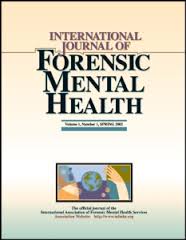The present study evaluated whether specific aspects of psychopathological constructs assessed by the Minnesota Multiphasic Personality Inventory-2 Restructured Form (MMPI-2-RF), and specific cognitive abilities assessed by the Wechsler Abbreviated Scale of Intelligence (WASI/WASI-II), were associated with length of competency restoration among 344 male pretrial defendants hospitalized in a maximum security forensic psychiatric hospital. Higher Juvenile Conduct Problems (JCP) scores were associated with restoration within 90 days, and Antisocial Behavior (RC4) predicted restoration status at 90 days. No MMPI-2-RF or WASI/WASI-II scales predicted restoration status at 180 days when controlling for age. This is the bottom line of a recently published article in the International Journal of Forensic Mental Health. Below is a summary of the research and findings as well as a translation of this research into practice.

Featured Article | International Journal of Forensic Mental Health | 2018, Vol. 17, No. 2, 167-180
Personality, Psychiatric, and Cognitive Predictors of Length of Time for Competency to Stand Trial Restoration
Author
Laura M. Grossi, M.A., School of Psychology, Fairleigh Dickinson University, Teaneck, NJ, USA
Debbie Green, Ph.D., School of Psychology, Fairleigh Dickinson University, Teaneck, NJ, USA
Melanie Schneider, M.A., School of Psychology, Fairleigh Dickinson University, Teaneck, NJ, USA
Brian Belfi, Psy.D., Department of Psychology, Kirby Forensic Psychiatric Center, New York, NY USA
Shanah Segal, Psy.D., Department of Psychology, Kirby Forensic Psychiatric Center, New York, NY USA
Abstract
Certain defendant characteristics, including psychiatric diagnosis, externalizing problems, and cognitive deficits, are associated with longer periods of restoration of competency to stand trial and general lack of treatment success. Prior research has called for a more detailed examination of symptom-level differences between defendants rapidly restored to competency and those who require lengthier treatment for competency restoration. The present study evaluated whether specific aspects of psychopathological constructs assessed by the Minnesota Multiphasic Personality Inventory-2 Restructured Form (MMPI-2-RF), and specific cognitive abilities assessed by the Wechsler Abbreviated Scale of Intelligence (WASI/WASI-II), were associated with length of competency restoration among 344 male pretrial defendants hospitalized at a maximum security forensic psychiatric hospital. Higher Juvenile Conduct Problems (JCP) scores were associated with restoration within 90 days, and Antisocial Behavior (RC4) predicted restoration status at 90 days; no MMPI-2-RF or WASI/WASI-II scales predicted restoration status at 180 days when controlling for age. Overall, results suggested that externalizing behaviors are among factors that may play a role in predicting restoration status at select time points.
Keywords
Competency to stand trial, competency restoration, symptoms, MMPI-2-RF, WASI-II
Summary of the Research
“In the United States, defendants facing legal charges must be competent to stand trial (CST) in order to move forward with their legal proceedings…Accurate evaluations of CST are imperative, as the courts generally defer to the opinions of forensic evaluators with regard to the competency of defendant…Although prior research has examined the extent to which defendant characteristics including psychopathology, personality, and intellectual abilities predict length of stay and treatment completion in other settings, this approach has not yet been used with regard to length of treatment for competency restoration. The current study examined whether the MMPI-2-RF and WASI/WASI-II have clinical utility in predicting the length of time that IST defendants undergo restoration of competency to stand trial, operationalized as the number of days from admission to the hospital to the date in which they passed a formal CST evaluation” (p. 167-170).
“We hypothesized that scores on the MMPI-2-RF scales assessing problems in thinking and externalizing problems would be positively associated with length of time for competency restoration, with the length of restoration variable defined (1) continuously, reflecting the number of days from hospital admission until a passed formal CST evaluation, and (2) dichotomously, representing restoration status at 90 days and 180 days…we additionally hypothesized that composite scores (FSIQ-2) and subtest scores (Vocabulary and Matrix Reasoning) of the WASI/WASI-II would be negatively associated with length of time for restoration of competency to stand trial…Finally, the present study explored whether reasons for MMPI-2-RF profile un-interpretability were predictive of time to achieve competency restoration” (p.170).
“Analyses examining whether IST and CST defendants could be differentiated at 90 days based on MMPI-2-RF and WASI/WASI-II scores indicated that only JCP scores significantly differentiated those who were restored and those who were not, although RC4 approached significance. However, both the results of JCP and RC4 analyses were contrary to prediction, with those defendants who remained IST endorsing fewer conduct-related problems in child and adolescence, and fewer antisocial beliefs, than those who were CST at 90 days…the hypothesis that MMPI-2-RF and WASI/WASI-II scales would be predictive of restoration status at 180 days was not supported…Overall, exploratory findings suggest that estimated general intelligence and level of education may be more robust predictors of requisite time for competency restoration, such that low intelligence is associated with greater time until competency is restored” (p.176-177).
“Further, a large proportion of defendants were excluded due to invalid or inconsistent MMPI-2-RF profiles (42.4%), which calls into question the generalizability of the findings for the major analyses to the broader population of IST pretrial defendants…Thus, the exclusion criteria may have obscured our ability to assess fully the combined impact of cognitive abilities and personality characteristics on competency restoration. The exclusion criteria used in this study were consistent with prior research examining treatment adherence and completion in other settings but may be too stringent considering the severity of mental illness in the present sample…” (p.178).
Translating Research into Practice
“As measures of behavioral instability and oppositionality (i.e., scales nested under BXD within the MMPI-2-RF interpretation hierarchy), the JCP and RC4 scales likely have implications for management in the forensic psychiatric hospital, in terms of reflecting chronic behavior problems and lack of cooperation…Instead, the ability of JCP to differentiate IST and CST defendants at a time point as early as 90 days may indicate that forensic psychiatric hospitals are well-equipped to work with defendants with antisocial characteristics and to ensure that legal and hospital resources are allocated appropriately. Furthermore, these scales may be indicators of familiarity with the legal system, and thus better response to psychoeducational aspects of competency restoration. Alternatively, these scales may serve to differentiate patients whose traits are more criminogenic, and less psychiatric in nature, and thus require a lesser degree of pharmacological intervention than their peers…” (p.176-177).
“Overall, exploratory findings suggest that estimated general intelligence and level of education may be more robust predictors of requisite time for competency restoration, such that low intelligence is associated with greater time until competency is restored…These findings raise important implications for clinicians, who can quickly assess estimated general intelligence, gaining information regarding a defendant’s relative time for competency restoration, without the administration of more extensive cognitive tests or other additional measures” (p.177).
Other Interesting Tidbits for Researchers and Clinicians
“…Both the results of the JCP and RC4 analyses were contrary to prediction, with those defendants who remained IST endorsing fewer conduct-related problems in childhood and adolescence, and fewer antisocial beliefs, than those who were CST at 90 days. These findings…are inconsistent with literature indicating that elevated RC4 and JCP scores…predict treatment failure in non-forensic contexts. The achievement of competency is not necessarily comparable to treatment success in other therapeutic contexts, and this finding may be interpreted in a straightforward manner, to mean that different personality characteristics have different predictive utility in different contexts. Notable tendencies toward antisocial or criminogenic behaviors…may lead evaluators to believe that a defendant in this context (i.e., a maximum security forensic hospital) is more likely to possess competency-related abilities…which would not be typically perceived as beneficial in non-forensic clinical contexts (e.g., civil hospital)” (p.176).
“Given the exclusion rate, future research might examine the ability of tests of personality and intelligence to predict time until competency restoration using a much larger sample. Larger samples might include female participants, as the present findings are not necessarily generalizable to the broader population of incompetent pretrial defendants. With a much larger sample, future research might examine whether elevations on specific scales…are predictive of time for competency restoration, as opposed to relatively high or low scores. Such an approach would be more informative for clinicians, who could then interpret scores above or below a particular threshold as indicative of alternative treatment…” (p.178).
Join the Discussion
As always, please join the discussion below if you have thoughts or comments to add!






